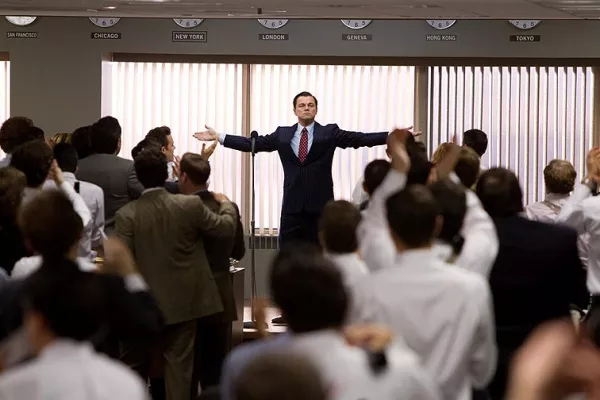
- The Wolf of Wall Street
After more than 40 years of remarkable movies—documentary, biography, historical epic, drama, thriller, comedy, even family fare—there’s no way to pigeonhole Martin Scorsese as a filmmaker. But one thing is clear: Nobody does a better job of capturing the breathtaking appeal of taking a criminal shortcut to the top of the world while also showing how far there is to fall.
The Wolf of Wall Street finds Scorsese diving into a milieu that’s new to him—the cutthroat, manic, excessive world of America’s financial Masters of the Universe—yet he’s exploring it in a familiar way.
He’s directed plenty of indelible portraits of hard men and the ruthless things they do to gain and preserve power, from Gangs of New York’s Bill the Butcher to The Departed’s Frank Costello. But The Wolf of Wall Street resembles nothing so much as a variation on the rags-to-riches-to-chaos arc of GoodFellas—and such a touchstone only makes Scorsese’s magnificent assault on financial-industry avarice more brutally effective.
He’s adapting the memoir by Jordan Belfort (Leonardo DiCaprio), who built his own brokerage firm from the ground up and made himself—and plenty of his colleagues—into multimillionaires in the 1990s. The story flashes back to Belfort’s early days learning at the knee of his mentor, Mark Hanna (Matthew McConaughey), and developing a relentless cold-call sales approach that allows him to get rich selling volatile penny stocks. And from there he builds an empire, one fueled by plenty of drugs, hookers and the money money money that just keeps rolling in.
Scorsese takes three hours to tell the story of that empire’s rise and fall, yet it’s impossible to overstate how nimble and effortless that running time feels. The director knows how to tell meaty stories in a way that entertains, starting with Hanna’s multi-martini lunch lecture to Belfort about the keys to making it big in the brokerage game; McConaughey hilariously nails the amped-up Hanna’s mix of not-suitable-for-work wisdom and chest-thumping tribal chants. Scorsese serves up brilliantly insane and offensive conversations, like Belfort and his partners going over the fine print as they prepare to bring some dwarf-tossing entertainment to the office. And while slapstick humor may not be the first thing that comes to mind when you think of a Scorsese movie, there’s a sequence here—involving a Quaalude-blasted Belfort trying to make his way out of a doorway, down a few stairs and into his car—that instantly allows DiCaprio to enter the pantheon of all-time physical-comedy performances.
But this is fundamentally a morality play—or, perhaps more accurately, a melding of a couple of different kinds of morality plays. In part, it’s a story of addiction, one that—for all of Belfort’s monstrous appetites for coke, ’ludes and women—is primarily about addiction to money, to chasing the thrill of selling people crap and getting rich doing it.
Yet it’s also about capturing the way Belfort is such a close analog of GoodFellas’ Henry Hill, dazzled by the extravagant lifestyle his criminality allows, even if it puts either his liberty or his life at risk on a regular basis. In so doing, Scorsese also shows how much the American financial industry behaves like a crime syndicate, with an arrogance built on the assumption that living well makes you invincible. DiCaprio nails that sensibility throughout his performance, though perhaps nowhere better than in a conversation with a federal investigator (Kyle Chandler) that drips with mutual contempt—the law enforcement agent for this cocky punk, and the cocky punk for anyone who’s sucker enough to try to live straight.
If anything prevents this wildly entertaining piece of work from being a flat-out masterpiece, it’s exactly that sense that this is basically GoodFellas transferred to a different brand of crooks. By the time we reach the point where Belfort is on the hook of the feds and forced to consider turning rat on the guys who were part of his loyal crew, The Wolf of Wall Street is breaking little new ground in telling the story of a guy whose appetites push him over the edge. But this collection of great set pieces and dynamic performances does provide its own brand of originality: putting the dangerous characters threatening America not on the other end of a gun, but on the other end of a phone.
THE WOLF OF WALL STREET
Leonardo DiCaprio, Jonah Hill, Margot Robbie
Rated R
Twitter: @ScottRenshaw